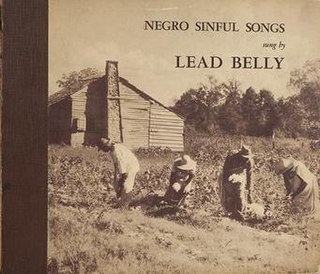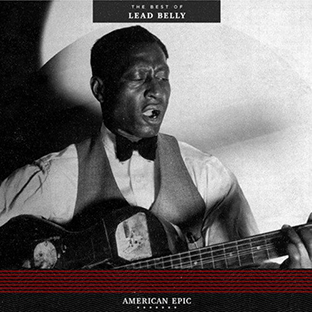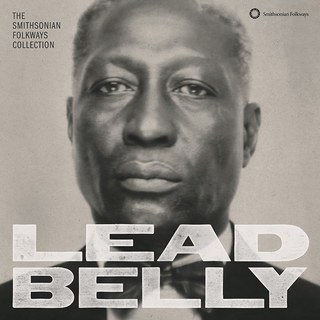Related Research Articles

Huddie William Ledbetter, better known by the stage name Lead Belly, was an American folk and blues singer, musician, and songwriter notable for his strong vocals, virtuosity on the twelve-string guitar, and the folk standards he introduced, including his renditions of "In The Pines", "Goodnight, Irene", "Midnight Special", "Cotton Fields", and "Boll Weevil".

Willie Mae Thornton, better known as Big Mama Thornton, was an American rhythm-and-blues singer and songwriter. She was the first to record Leiber and Stoller's "Hound Dog", in 1952, which became her biggest hit, staying seven weeks at number one on the Billboard R&B chart in 1953 and selling almost two million copies. Thornton's other recordings included the original version of "Ball and Chain", which she wrote.

"Goodnight, Irene" or "Irene, Goodnight," is a 20th-century American folk standard, written in 3
4 time, first recorded by American blues musician Huddie 'Lead Belly' Ledbetter in 1933.

"Black Betty" is a 20th-century African-American work song often credited to Huddie "Lead Belly" Ledbetter as the author, though the earliest recordings are not by him. Some sources claim it is one of Lead Belly's many adaptations of earlier folk material.
"The Bourgeois Blues" is a blues song by American folk and blues musician Lead Belly. It was written in June 1937 in response to the discrimination and segregation that he faced during a visit to Washington, D.C. to record for Alan Lomax. It rails against racism, the Jim Crow laws, and the conditions of contemporary African Americans in the southern United States. The song was recorded in December 1938 for the Library of Congress and re-recorded in 1939 for commercial release.
"In the Pines", also known as "Where Did You Sleep Last Night?", "My Girl" and "Black Girl", is a traditional American folk song originating from two songs, "In the Pines" and "The Longest Train", both of whose authorship is unknown and date back to at least the 1870s. The songs originated in the Southern Appalachian area of the United States in the contiguous areas of Eastern Tennessee and Kentucky, Western North Carolina and Northern Georgia.
"He Never Said a Mumblin' Word" is an American Negro Spiritual folk song.
"Grey Goose" is a traditional American folk song. Its subject is a preacher who hunts and captures a grey goose for dinner on a Sunday. He tries to kill the goose prior to eating it, but no matter how hard he tries, he cannot kill it, the implication being that he had not properly observed the Sabbath. The various methods the preacher used to unsuccessfully kill the grey goose were, in order according to the song:

Joshua Daniel White was an American singer, guitarist, songwriter, actor and civil rights activist. He also recorded under the names Pinewood Tom and Tippy Barton in the 1930s.
"Rock Island Line" is an American folk song. Ostensibly about the Chicago, Rock Island and Pacific Railroad, it appeared as a folk song as early as 1929. The first recorded performance of "Rock Island Line" was by inmates of the Arkansas Cummins State Farm prison in 1934.
"See See Rider", also known as "C.C. Rider", "See See Rider Blues" or "Easy Rider", is a popular American 12-bar blues song that became a standard in several genres. Gertrude "Ma" Rainey was the first to record it on October 16, 1924, at Paramount Records in New York. The song uses mostly traditional blues lyrics to tell the story of an unfaithful lover, commonly called an "easy rider": "See see rider, see what you have done", making a play on the word "see" and the sound of "easy".
"Take a Whiff on Me" is an American folk song, with references to the use of cocaine. It is also known as "Take a Whiff ", "Cocaine Habit", and "Cocaine Habit Blues".

American Epic: The Best of Lead Belly is a compilation of Lead Belly's first commercial recordings made in 1935 and released in 2017 to accompany the award-winning American Epic documentary film series. The album was released as a 14-track download and a vinyl LP.

The Smithsonian Folkways Collection is a career-spanning box set of recordings by American folk and blues singer Lead Belly. It was released in 2015 by Smithsonian Folkways.

Work Songs of the U.S.A. is an album by Lead Belly, recorded in 1942 and released a few months later by Asch Recordings.
"I Shall Be Free" is a song by American singer-songwriter Bob Dylan. It was recorded on 6 December 1962 at Studio A, Columbia Recording Studios, New York, produced by John Hammond. The song was released as the closing track on The Freewheelin' Bob Dylan on 27 May 1963, and has been viewed as a comedic counterpoint to the album's more serious material. Dylan has never performed the song in concert.

Songs by Lead Belly is an album by Lead Belly, recorded in 1943 by Asch Recordings and probably released in 1944.

Negro Folk Songs is an album by Lead Belly, recorded in 1943 and released as an album in early 1946.
References
- 1 2 van Rijn, Guido (1997). Roosevelt's Blues: African American Blues and Gospel Songs on FDR. University of Mississippi Press. p. 174. ISBN 1604731656.
- ↑ National Museum Of African American History (2010). "The Apollo and Civil Rights". Ain't Nothing Like the Real Thing: How the Apollo Theater Shaped American Entertainment. Smithsonian Institution. p. 170. ISBN 978-1588342690.
- ↑ "Preach, Leadbelly, Preach". Jewish Telegraphic Agency. July 25, 2012. Retrieved March 12, 2020.
- ↑ "Hitler Song by Leadbelly". Songfacts. Retrieved March 12, 2020.
- ↑ Light, Alan (February 22, 2015). "Lead Belly, Folk-Music Giant, Has a Smithsonian Moment". New York Times . Retrieved March 12, 2020.